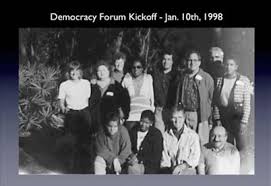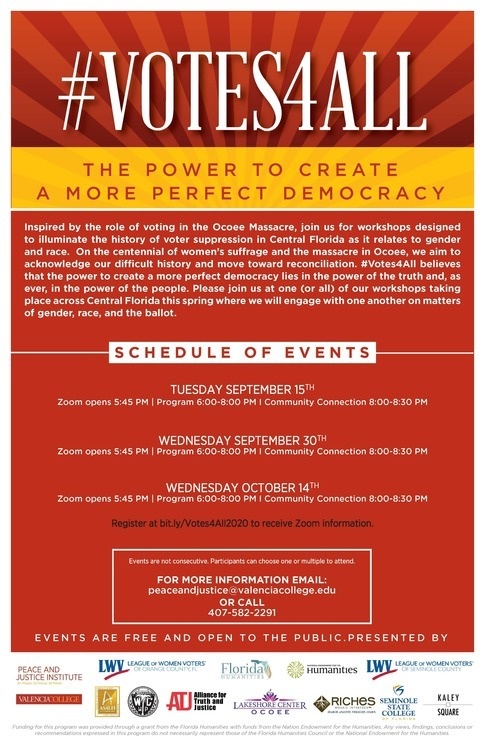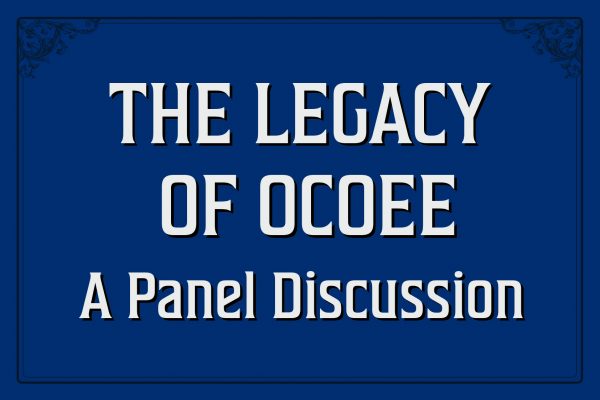Chapter 15: Community Participation and Activism
Democracy Forum

In 1997, members of the First Unitarian Church of Orlando established the Democracy Forum. Cathleen L. Armstead, one of its members, defined it as a multi-racial group, diverse in gender, age, class, and education that carried out the historical investigation into the Ocoee Massacre. The project began with the goal of conducting historical research through oral interviews, commemorating July Perry and other victims of the massacre, and presenting this research in a variety of community dialogues.
(Photo courtesy of Julian Chambliss.)
The first public presentation took place in Ocoee at Borders bookstore in late 1998, intending to bring to light the events of the massacre and establish community conversations. There were disagreements and discrepancies among the members of the public who attended the meeting. Many questioned the term “massacre” arguing that there was not enough historical evidence to support its use; others claimed that it was not the residents of Ocoee but people from other places who were responsible for the violence. There was also resistance to the event itself. According to an article published by the Orlando Weekly, then-Mayor Scott Vandergrift unsuccessfully tried to persuade the bookstore manager to cancel the event “on the grounds that white peoples’ views would not be fairly represented.” Vandergrift denied that he tried to cancel the event, but he admitted he told the bookstore’s managers “what kind of group they were dealing with.”
The Democracy Forum was instrumental in successfully locating July Perry’s unmarked gravesite in Orlando’s Greenwood Cemetery. After approximately a decade of work, the group disbanded, “believing that, while failing in some goals, they had achieved the goal of creating public awareness of the incident and educating the descendants of the African Americans forced to leave the community.”
Oral History of Democracy Forum member Sandy Cawthern:
Truth and Justice Project of Orange County/Alliance for Truth and Justice

The Truth and Justice Project of Orange County was a multi-racial organization allied with the Equal Justice Initiative in Montgomery, Alabama. Various activist organizations in Orange County, including Bridge the Gap Coalition, were represented in the Truth and Justice Project. The organization focused on the history of lynching in Central Florida, documenting the Ocoee Massacre, and drawing public attention to the election day violence. The Truth and Justice Project included some members of the earlier Democracy Forum. Among its most visible activities, the Truth and Justice Project collected soil from the site of the July Perry lynching for the Legacy Museum in Montgomery and arranged for the Equal Justice Initiative-created historic marker that stands in front of the Orange County Regional History Center.
In the weeks leading up to the dedication of the historic marker, a schism developed over leadership and direction within the Truth and Justice Project. Subsequently the organization split into two groups along ideological rather than racial lines: the Truth and Justice Project and a second group called the Alliance for Truth and Justice.
#Votes4All

The Peace and Justice Institute at Valencia College, in partnership with a dozen community organizations, presented five free public workshops between February 18 and May 13, 2020, that examined the role of gender and race in voting in Central Florida’s past. The series continued a program of active community discussion and education inspired by the Ocoee Massacre of 1920. A multi-racial, multi-ethnic, multi-religious steering committee organized and facilitated the events. Funded through a grant by Florida Humanities, the community discussions faced numerous challenges.
The first challenge centered on the increasingly confrontational public atmosphere of 2020. The steering committee struggled with how to address issues of race, gender, white supremacy, and voting in ways that could lead to productive discussion to address long-term community pain. The second challenge was the unanticipated appearance of Covid-19 and the halt of large audience events. In the shift to online presentations, the audiences were somewhat smaller, but the central features remained intact. Scholars made short presentations and each set of topics was followed by group discussions in Zoom break-out rooms. As the groups converged, a spokesperson for each reported on one or two points for the entire audience. It was perhaps the only opportunity for participants from multiple backgrounds to openly discuss the violence of Ocoee and its implications for the present.
The Legacy of Ocoee: A Panel Discussion at the Orange County Regional History Center

On October 29, 2020, the Orange County Regional History Center hosted a panel of experts to discuss the event and the dark legacies the Ocoee Massacre left in Central Florida. Speakers included Florida State Sen. Randolph Bracy, State Rep. Geraldine Thompson, Dr. Paul Ortiz of the University of Florida’s history faculty, and community historian Francina Boykin. This panel discussion was moderated by the History Center’s chief curator, Pam Schwartz, and coincided with the special exhibition, “Yesterday, This Was Home: The Ocoee Massacre of 1920.”
______________________________________________________________________________________________________________________________
[1] Paul Ortiz, “Ocoee, Florida: Remembering ‘the Single Bloodiest Day in Modern U.S. Political History’.” Facing South (Blog), May 14, 2010. https://www.facingsouth.org/2010/05/ocoee-florida-remembering-the-single-bloodiest-day-in-modern-us-political-history.html [accessed Sep.29, 2020]
[2] Cathleen L. Amstead, “Competing Narratives, Fragmented Community. Stories of the Ocoee Massacre of 1920,” in Selected Annual Proceeding of the Florida Conference of Historians. Annual Meeting 200/2001. Volumes 8/9, February 2002. 57
[3] Edward Jr. Ericson, “Dead Wrong,” Orlando Weekly, October 1, 1998. Accessed October 6, 2020. https://www.orlandoweekly.com/orlando/dead-wrong/Content?oid=2258296
[4] Katherine K., Parry, Constructing African American Histories in Central Florida. 48. [Electronic Resource]. University of Central Florida, 2008. https://search.ebscohost.com/login.aspx?direct=true&db=cat00846a&AN=ucfl.029288428&site=eds-live&scope=site.
https://www.orlandosentinel.com/news/os-xpm-1998-11-02-9811020046-story.html